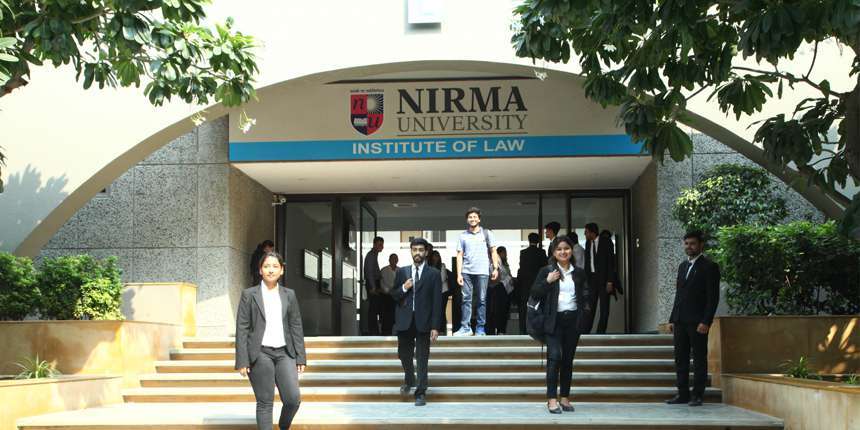The Institute of Law, Nirma University envisions to shape better future for human kind by developing effective and socially responsible individuals and organisations.

It aims at the holistic development of its students and who are not only good professionals but also good and worthy citizens of a great country who can aid in the overall progress and development. It endeavours to treat every student as an individual, to recognize their potential and to ensure that they receive the best preparation and training for achieving their career ambitions and life goals.
These aims and ambitions can be achieved only with the teaching and learning process where the Students and Trainers indulge in a process marked by mutual respect, trust, and agency. The evolution of law school teaching methodology primarily aims to train adult learners.
The methodology of training the adults is known as andragogy. This methodology emphasizes that adults are more likely to question the needs of learning. Thus, they need answers to questions like what is the need to learn something. What to expect in the process of learning? And how will the learning help them perform specific tasks or solve particular problems?
The andragogy is based on the premise that the adults are autonomous and self-directed independent thinkers responsible for their own decisions, and adults have accumulated a more significant body of experience than children and expect to use that experience as a resource in the process of learning.
The teaching learning process at ILNU is based on the philosophy of reinventing legal education by the most suitable methodology, which provides the opportunities to nurture the creative skills of learners. The theory must be supplemented with the practical approach that connects the classrooms with the real world.
The case method, which was designed to teach students “how to think like lawyers,” was based on the idea of “law as a science,” an assumption that fuelled the concept that the most important skill students needed to learn was the application of appellate decisions to the circumstances of individual cases.
Considering the expanding demand for practice-ready professionals in civil, criminal, and other recognized branches of practice, as well as the growing demand for ready-to-join applicants and qualified justice providers. This demand can be met only when there is an emphasis on clinical legal education, which requires that all students gain practical experience in the field.
It is a teaching technique that strives to offer students practical legal skills, professional responsibility, and social justice teachings in a hands-on learning setting. The primary purpose of this teaching style is to assist law students in learning about these essential topics through their experiences with real clients or simulated exercises, which allows students to understand how lawyers conduct their profession and learn from their experiences and reflective practice.
In addition, the metacognitive methods of teaching and learning process are the most critical skills that law schools can offer to students to help them become better lifetime learners. This ability will help the students throughout their lifetime find solutions to problems that are presently unknown.
Keeping in mind the above goals, the Institute has designed the curriculum to provide ample space for students to interact with experts in the field. The Institute of Law has a Memorandum of Understanding with various foreign universities for student and teacher exchange. Different professors from foreign universities offer courses to ILNU students, and experts lectures areorganised in all the subjects.
In addition to all this, ILNU organises its annual flagship event of International Teaching Month in the month of February. This event witnessed the splendour of exchanging ideas by professors and other experts from various foreign universities and organizations, which enriches students’ learning process.
Furthermore, to give an in-depth understanding of the value of research in the field of law, the ILNU has various research centres of which students are required to be part of a curricular mandate. With the mentors of research centers, students publish multiple types of research recognized and indexed in various reputed databases.
The goal of clinical and socially relevant education is fulfilled by the Legal Aid Clinic and the extension activities of the Institute. The students are given training under the guidance of the clinical professors to deal with real-life problems which the legal aid clinic handles. This guidance throughout five years helps in grooming the practice-ready professionals.
Apart from the curricular activities, ILNU ensures a vibrant culture of co-curricular and extra-curricular activities for the holistic development of the students. Various competitions such as moot court, debate competition Model United Nations and Parliamentary debates, and various other activities are organised throughout the year. Also, the student takes part in various cultural events such as singing, dancing, literary fest, etc.
The overall environment at the ILNU, including the best in class infrastructure, world-class faculties, and well-equipped library and other facilities, ensures the best possible academic environment for a law student and ensures that the graduates of the ILNU can be socially responsible citizens.
Note: This is a sponsored post.
Disclaimer: We try to ensure that the information we post on Lawctopus is accurate. However, despite our best efforts, some of the content may contain errors. You can trust us, but please conduct your own checks too.
Source: Lawctopus

